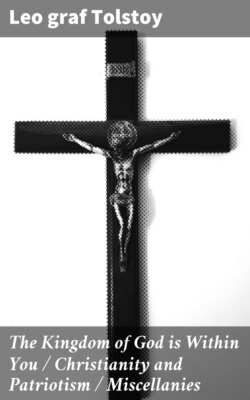Читать книгу The Kingdom of God is Within You / Christianity and Patriotism / Miscellanies - Leo Graf Tolstoy - Страница 4
На сайте Литреса книга снята с продажи.
II.
ОглавлениеTable of Contents
The same impression of a desire to conceal, to pass in silence, what I attempted so carefully to express in my book, has been produced on me by the criticisms upon it.
When my book appeared, it was, as I had expected, prohibited, and according to the law it ought to have been burned. But, instead of being burned, it was distributed among the officials, and it was disseminated in a large number of written copies and lithographic reprints, and in translations printed abroad. Very soon there appeared criticisms upon the book, not only by the clergy, but also by the laity, which the government not only sanctioned, but even encouraged, so that the refutation of the book, which was assumed to be unknown to any one, was made a theme for theological essays in the academies.
The critics upon my books, both the Russian and the foreign critics, can be divided into two classes: into the religious critics,—people who consider themselves to be believers,—and lay critics, who are freethinkers.
I shall begin with the first:
In my book I accuse the church teachers of teaching contrary to Christ's commandments, which are clearly and definitely expressed in the Sermon on the Mount, and especially contrary to the commandment about non-resistance to evil, thus depriving Christ's teaching of all significance. The church teachers recognize the Sermon on the Mount with the commandment about non-resistance to evil as a divine revelation, and so, if they have found it necessary to write about my book at all, they ought, it would seem, first of all to answer this chief point of accusation and say outright whether they consider the teaching of the Sermon on the Mount and of the commandment about non-resistance to evil obligatory for a Christian, or not,—and they must not answer it as this is generally done, that is, by saying that, although on the one hand it cannot properly be denied, on the other it cannot be affirmed, the more so that, and so forth,—but must answer it just as the question is put by me in my book: did Christ actually demand from His disciples the fulfilment of what He taught in the Sermon on the Mount? and so, can a Christian, remaining a Christian, go to court, taking part in it and condemning people, or seeking in it defence by means of violence, or can he not? Can a Christian, still remaining a Christian, take part in the government, using violence against his neighbours, or not? And the chief question, which now, with the universal military service, stands before all men,—can a Christian, remaining a Christian, contrary to Christ's injunction, make any promises as to future acts, which are directly contrary to the teaching, and, taking part in military service, prepare himself for the murder of men and commit it?
The questions are put clearly and frankly, and, it would seem, they ought to be answered clearly and frankly. But nothing of the kind has been done in all the criticisms upon my book, just as nothing of the kind has been done in the case of all those arraignments of the church teachers for departing from Christ's law, with which history is filled since the time of Constantine.
Very much has been said in reference to my book about how incorrectly I interpret this or that passage in the Gospel, how I err in not acknowledging the Trinity, the redemption, and the immortality of the soul; very much has been said, but this one thing, which for every Christian forms the chief, essential question of life: how to harmonize what was clearly expressed in the teacher's words and is clearly expressed in the heart of every one of us,—the teaching about forgiveness, humility, renunciation, and love of all men, of our neighbours and of our enemies,—with the demand of military violence exerted against the men of one's own nation or another nation.
Everything which may be called semblances of answers to this question may be reduced to the five following divisions. I have tried in this respect to collect everything I could, not only in reference to the criticisms upon my book, but also in reference to what has been written upon the subject in former times.
The first, the rudest way of answering, consists in the bold assertion that violence does not contradict Christ's teaching, and that it is permitted and even prescribed by the Old and the New Testament.
Assertions of this kind issue for the most part from people high up in the governmental or ecclesiastic hierarchy, who are, therefore, quite convinced that no one will dare to contradict their assertions, and that if one actually dared to do so, they would not hear these objections. These men have, in consequence of their intoxication with their power, for the most part to such an extent lost the concept of what that Christianity is, in the name of which they occupy their places, that everything of a Christian nature in Christianity presents itself to them as sectarian; but everything which in the writings of the Old and the New Testament may be interpreted in an anti-Christian and pagan sense, they consider to be the foundation of Christianity. In favour of their assertion that Christianity does not contradict violence, these men with the greatest boldness generally bring forward the most offensive passages from the Old and the New Testament, and interpret them in the most non-Christian manner: the execution of Ananias and Sapphira, the execution of Simon Magus, and so forth. They adduce all those words of Christ which may be interpreted as a justification of cruelty, such as the expulsion from the temple, "It shall be more tolerable on that day for Sodom, than for that city," and so forth.
